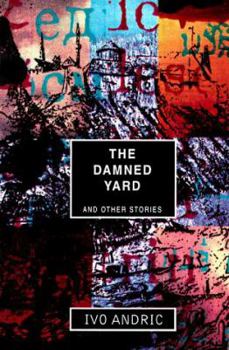The Damned Yard and Other Stories
Select Format
Select Condition 
Book Overview
No Synopsis Available.
Format:Paperback
Language:English
ISBN:1856100227
ISBN13:9781856100229
Release Date:January 1992
Publisher:Forest Books
Length:218 Pages
Weight:0.05 lbs.
Dimensions:0.6" x 5.5" x 8.3"
Related Subjects
Anthologies Contemporary Fiction Literature & Fiction Short Stories World LiteratureCustomer Reviews
3 ratings
Stories About Stories
Published by Thriftbooks.com User , 25 years ago
Andric, the only writer from the former Yugoslavia to win the Nobel Prize for Literature (in 1961), is best known for his sweeping novel about Bosnia "A Bridge on the Drina". In this collection he reveals his love for stories. There are stories about stories, stories told through internal stories, stories about story-telling and stories about story-tellers. Here are recurring elements of Andric's work, a fine eye for earthy detail, a profound understanding of life under the Ottomans, and a reflexive rejection of generalization. Ethnic tension ripples under the surface of all the tales, most of which occur under Ottoman rule. The description of the uniquely powerful Bosnian hatred in The Story of the Vizier's Elephant, "the object becomes secondary, only its name remains, and the hatred crystallizes, grows out of itself, according to its own laws and needs..." is a theme reinforced in A Letter from 1920, "Hatred which sets man against man and casts both alike into misery and misfortune, or drives both opponents to the grave; hatred like a cancer in an organism, consuming and eating up everything around it, only to die itself at the last." Bosnia was never a cultural melting-pot of understanding and harmony; intolerance and fear have always been palpable backdrops to everyday life.Other striking images: the depiction of the Vizier's evolving superstition in The Bridge on the Zepa, "The triumphant Vizier had come to know the fear of life. So, unawares, he entered the stage which is the first phase of dying, when a man comes to be absorbed more in the shadows of things than in the things themselves". The description of a craftsman in The Climbers: "To be a craftsman is to be able to separate the work one is doing at the time from everything else, to know exactly and to hold before one's eyes one thing only: what should be done and how..." And finally, the title novella The Damned Yard, which refers to an Istanbul prison and the story-tellers incarcerated there. It is a curious narrative, reminiscent of "1001 Arabian Nights" where every tale draws us seamlessly into the next until we forget where we started. Andric is quite simply a great writer. These are great stories.
A book wich brought him the Nobel prize
Published by Thriftbooks.com User , 25 years ago
Ivo Andric's The damned yard has less or more the same subject as his other book it gives a picture of the medeavle Balkans. But there is something that radically differs this book hrom the others, it tells about the writting it self. It speaks of the 'story' as a basic instrument of human comunication and even more of lasting. This way Andric drives us back to an all-time topic of literature, wich we can follow all the way back to the 1001 night. A true masterpiece.
Condensed Andric
Published by Thriftbooks.com User , 26 years ago
The central theme in this collection of short stories is storytelling of past events. There are several stories that contain implicit comments by Andric, himself a storyteller. Most of the storytelling will suit those who have a soft spot for the Balkan people. Reactions from my classmates who have also read the book have been mixed. But even those who did not like the stories did appreciate the insights.Andric is the master of prediction, and one of the stories (A Letter From 1920) essentially pinpoints the history of the region, and accurately describes its people--all in several pages.Many stories are essentially a small-scale summary of The Chronicles and The Bridge. There are relationships between the Christians and the Turks, among the Christians, among the Turks, etc.






